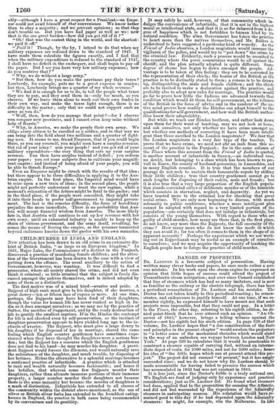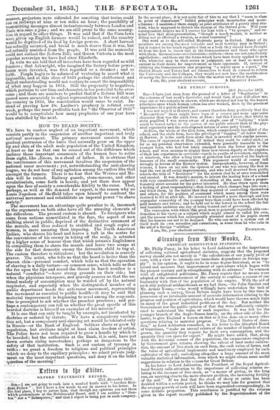DANGER OF PROPHECIES.
Die. LARDNEII is a favourite subject of persecution. Having written many clever books and papers, he once made rather a seri- ous mistake. In his work upon the steam-engine he expressed an opinion that little hopes of success could attend the projeet.of Transatlantic steam navigation ; and ever since Cunard established that line of steamers which has had so many imitators, and is now as familiar as the railway or the electric telegraph, there has been a periodical resuscitation of Dr. Lardner and his mistake. The Doctor has not taken kindly to this periodical roasting ; he remon- strates, and endeavours to justify himself. At one time, if we re- member rightly, he expressed himself to have meant not that such projects were impossible, but that they could not pay. In a letter to the Times, the other day, referring to his eighth edition, he de- nied point-blank that he ever uttered such an opinion. "An Ob- server of 1845," however, brings a telling witness against the Doctor—not his eighth but his sixth edition. In page 320 of that volume, Dr. Lardner hopes that "a due consideration of the facts and principles in the present chapter" would awaken the projectors to "a better sense of the mechanical obstacles which would atand in the way of an unbroken sea voyage between London and New York." At page 320 he calculates that it would be practicable to construct a steamer capable of carrying fuel, without an interme- diate depot of coals, for 2500 miles, and not for 3500 miles ; hence his idea of "the little hopes which can at present athend:this pro- ject." The project did not succeed "at present," but it has amply succeeded since; and we do not know why Dr. Lardner aluntlk be made accountable for having failed to perceive the success which has accumulated in 1858 but was not existent M 1845.
It is less just, since the Doctor's foible is a truly national one. We English are fond of judging' only by experience and practical considerations ; just as Dr. Lardner did. He found what steamers had done, applied that to the proposition for crossing thelAtititdic, and did not feel warranted by the experience of the Adialialty steamers in anticipating success. His refutation would have re- mained good to this day if be had depended upon: the Admiralty steamers : he might, for example, cite the Melbourne. In like
mannqr,RTojeotors were ridiculed for_ asserting that trains could ruii on railways at nine or ten miles an hour ; the possibility of transmitting messages almost instantaneously between London and Paris was once a joke ; and we are still prone to the same assumji- tion in regard to other things. It was said that if the Corn-laws were given up English farmers would be ruined, and the country would he deprived of its food by foreign powers. A short harvest has actually occurred, and bread is much dearer than it was, but not actually snatched from the people. It was said the monarchy could not outlast the Reform Bill; and Queen Victoria is the most popular sovereign we have had since Elizabeth. In vain we are told that all inventors have been regarded as wild fanoiers ; that Arkwright, who imagined the factory before power-. looms were invented, was first regarded as a dreamer ; and so 6rth. People begin to be ashamed of venturing to assert what is wipossible, and at this close of 1853 perhaps the stubbornest and aillest understanding would not venture to assert the impossibility of what may happen in 1854. Still the propensity to negatives, which.pertains to our time and character, is too powerful to be over- come ; and there are numbers to predict that if a Reform Bill were passed more accurately to adjust representation to the real state of the country in 1854, the constitution would cease to exist. In- stead of proving how Dr. Lardner's prophecy is refuted every week, perhaps the most profitable task for " the Observer of 1853 ' would be to recapitulate how many prophecies of one year have beers stultified by the next.



































 Previous page
Previous page